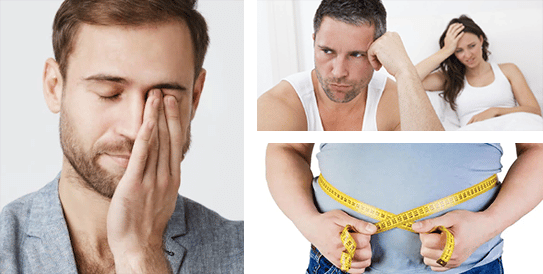Reclaim Your Youth and Vitality with TRT in Rochelle Park, NJ
It can be hard to hear for some, but getting older is just part of life. For many men, hitting a certain age signifies the beginning of a new chapter - where bucket list items are crossed off, and goals are accomplished. For others, however, aging is a scary prospect, filled with nagging injuries, embarrassing weight gain, and inability to perform intimately. Few things feel worse than realizing that you simply can't perform as you used to, whether on the basketball court or in the bedroom.
The reality is, as men get older and approach middle age, their testosterone levels drop. When a male's testosterone levels get lower, it can cause a slew of unwanted symptoms like:
If you have noticed any of the above symptoms and feel like you're just dragging yourself through life, don't lose hope. Many men around the country are experiencing the same feelings as you. Thankfully, you don't have to settle for the side effects of low testosterone. There are proven, easy steps that you can take to reverse the negative signs of aging. If you're ready to reclaim your youth and feel like you did in your 20s and 30s, testosterone replacement therapy (TRT) may be the perfect solution.
TRT bridges the gap between your old life and the happier, more vibrant version of you. That's where Juventee comes in - to facilitate your transition to a more youthful, fulfilling life and a brighter future. After all, aren't YOU supposed to be in charge of your wellness and health? With the Juventee team by your side, you'll have the tools to do so - backed by a personalized plan crafted by experts with more than 20 years of experience.
The Juventee Difference
At Juventee, we propose a preventive and proactive medical approach to preserve optimal body function, with the best hormonal functioning to prolong vitality and youthfulness. Our specialty is Age Management, which is based on the belief that balance is the key to wellness. We employ the most innovative science, offering treatments like TRT in Rochelle Park, NJ, and other clinical products with proven efficacy.
Living a younger, healthier, and longer life is a frequent commitment for Juventee's team of specialists. We are experts at designing customized programs that work synergistically with your body and brain. We love incorporating smart nutrition, hormonal balance, exercise, stress management, cognitive health, and lifestyle changes into our treatment programs. We also implement sciences such as testosterone replacement therapy to achieve verifiable, legitimate results.
Our doctors take differing approaches to care but share the single goal of prolonging your youth and vitality. With that goal in mind, Juventee was born from the hands of its partners, who want you to feel full strength, energy, joy, confidence, and wellbeing.
testosterone levels. Unfortunately, when a man loses too much testosterone, it results in a condition called hypogonadism. Also called "Low T," testosterone loss due to hypogonadism must be replenished, or the male suffers from difficult, even debilitating symptoms.
We Work With

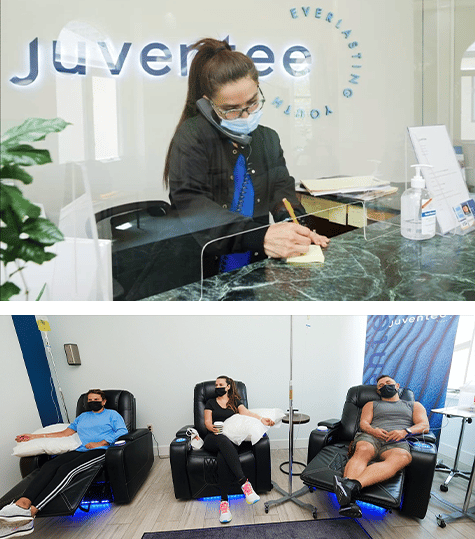
What is Testosterone?
What pops up in your head when you think about testosterone? Many people associate testosterone with being overly aggressive, macho, and violent. However, the truth is that testosterone is a critical hormone for men and affects the male lifespan from puberty through old age. As a sex hormone, male testosterone is produced through the testicles. It becomes most prevalent during puberty.
Testosterone production is controlled by the pituitary gland at the base of a man's brain. This gland sends signals to the testes, which in turn produce testosterone. A feedback loop helps regulate the amount of testosterone in the blood. When levels are too high, the brain orders the pituitary gland to restrict production.
Did You Know?
Cholesterol synthesizes the testosterone in your body. However, having high cholesterol doesn't mean you have high testosterone levels, too. T levels are too carefully controlled by your pituitary gland for cholesterol to raise testosterone levels.
During puberty, testosterone helps males develop:
- Body Hair
- Facial Hair
- Muscle Strength
- Increased Libido
- Deeper Voice
- Muscle Density
- Sperm
What is TRT in Rochelle Park, NJ?
Testosterone replacement is exactly what its name implies. It's a therapy for men that replaces diminished testosterone levels, which helps balance your hormones and ultimately improves your life. Also called androgen replacement therapy, TRT alleviates many of the side effects that men suffer from as a result of low testosterone.
Testosterone was originally synthesized in a lab in 1935. Its popularity has grown since, and today, it is among the most promising doctor-prescribed treatments for men in the United States.
So, how does testosterone replacement therapy work? TRT essentially gives you the testosterone needed to be healthy and have a properly functioning body. As the primary androgen for males, testosterone has a role in the natural processes your body needs for overall health. This extra hormonal intake positively affects patients and their general health, preventing diseases such as osteoporosis, cardiac diseases, and more.
Though there is an abundance of testosterone in your system throughout puberty and into your 20s, it gradually depletes with age. Sometimes, serious injuries and long-term conditions like diabetes affect testosterone levels. Unfortunately, when a man loses too much testosterone, it results in a condition called hypogonadism. Also called "Low T," testosterone loss due to hypogonadism must be replenished, or the male suffers from difficult, even debilitating symptoms.

Common Signs of Low Testosterone
Though some symptoms of low T are abundantly evident, not all men can immediately tell they may need TRT. If you're unsure, ask yourself these questions:
- Are you usually a productive powerhouse but now feel like you lack drive and motivation?
- Have you had a normal sex life in the past but now find that you're losing the ability to be intimate?
- Are you usually calm and collected, but your partner is complaining about your irritability?
If you answered yes to any of those questions, it could be time to contact Juventee about a personalized TRT plan. Still unsure if you're experiencing symptoms of low T? We have compiled a more extensive list of signs below:

Decreased Energy
Low energy used to be considered a normal part of aging. Today, most doctors know better. Modern advances in medicine show that lack of energy and low T often go hand-in-hand.
If it's a huge struggle to keep up with your kids on the soccer field, or you just don't have the energy to be active, you may have low testosterone. Getting tired is normal, but if it's an ongoing problem affecting you and your family, it's time to consult a doctor.
Whether you're having a tough time getting through your day or can't finish normal activities, TRT in Rochelle Park, NJ could be the solution.
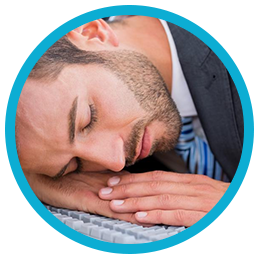
Lowered Libido
You would think that lowered libido would be easy to pick up on, but when it happens gradually, it can be more difficult to diagnose. With that said, many men use TRT because they've lost that "spark" in the bedroom. It's not easy for a man to hear that they're not pleasing their partner because intimacy is an important part of a relationship.
The good news? Having a low libido doesn't have to be permanent. TRT treatments can help revert hormone levels to their normal range, making for a more enjoyable sex life.

Hair Loss
If you're like millions of other men, hair loss is an unfortunate reality you don't want to think about. Closely related to hormone imbalances and testosterone decline, hair loss is about as distressing as it gets. This common symptom is often related to DHT - a derivative of testosterone that can cause hair follicles to die.
Thankfully, a carefully monitored TRT regimen can help restore hair, especially when combined with methods like plasma-rich therapy. While it's true that you can't change your genes, you can change the effects of low testosterone in your body, so hair loss isn't your only reality.
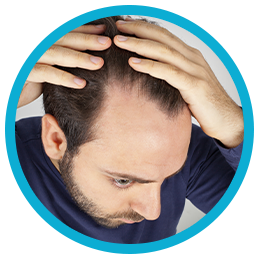
Inability to Achieve and Maintain Erections
Weak erections - it's an uncomfortable subject for men to talk about. It's even worse to experience the symptom in the heat of the moment. Despite being very common, men shame themselves when they can't achieve an erection. And while there are many reasons for this malady, low testosterone is often a contributing factor.
Fortunately, you don't have to live with weak erections forever when you balance your hormones with a personalized TRT treatment plan from Juventee.
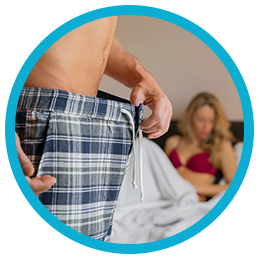
Depression
You're feeling down about everything and can't figure out why you feel crummy about life. You're successful at work but feel unaccomplished. If you're experiencing symptoms like these, you may be depressed - and it could be stemming from low testosterone.
Studies show that men with depression and high cortisol levels also commonly have low testosterone. Because higher cortisol levels can lead to low T, the chances of severe depression increase.
Depression is a very real disorder and should always be diagnosed and treated by your doctor. One treatment option, when used in conjunction with therapy, is TRT. When TRT is used to replenish hormone levels, men enjoy a lighter, more optimistic mood. That's great news for depressed men who have had little-to-no success with powerful anti-depression meds.

Lack of Sleep
Experts have found that men who lose a week's worth of sleep may experience a drop in testosterone by as much as 15%. These findings are alarming and may suggest that sleep loss lowers T levels and affects wellbeing.
If you find yourself exhausted at the end of the day but toss and turn all night long, it could be time to have your testosterone levels checked. TRT may restore your testosterone levels which can help you sleep better with proper exercise and diet.
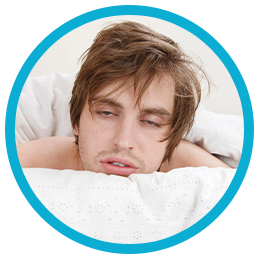
Loss of Strength and Muscle Mass
Are you struggling to lift weights in the gym or find that you can't pick up items that used to be easy to lift? Studies show that inactive men can lose .5% of muscle strength each year after the age of 25. When you hit 60, muscle loss doubles every ten years. While muscle loss is common with age, it can also be linked to low T.
Testosterone is a crucial piece needed for building and retaining muscle mass. That's why many doctors are prescribing TRT for males experiencing sharp declines in strength and muscle mass. Whether your workouts are losing steam or you're having problems lifting items that aren't very heavy, don't blame it all on age. You could be suffering from hypogonadism.

Weight Gain
Nobody likes to gain weight, even though our society is more accepting of overweight people than ever before. Despite diets and carb cutting, many men aren't able to get rid of excess belly and body fat, increasing the chances of heart disease and cancer.
Sometimes, male weight gain isn't caused by sweets and carbs but by hormone imbalances that slow the metabolism. This phase of life is called andropause and occurs when testosterone levels are low. Combining a low metabolism with other symptoms like high cortisol levels can be a recipe for a double-chinned disaster. Fortunately, TRT treatments and physician-led weight loss programs can correct hormone imbalances and lead to healthy weight loss for men.

Gynecomastia
The enlargement of male breast tissue, also called "man boobs," is a fairly common condition that many men have. Though it is closely associated with diet and other life choices, increased fatty tissue is often caused by hormonal imbalances.
If you're approaching middle age and you're embarrassed by having large breasts, don't lose hope. TRT is a safe, effective way to eliminate the underlying cause of gynecomastia without invasive surgery. With a custom HRT and fitness program, you can bring your testosterone and estrogen levels back to normal before you know it.
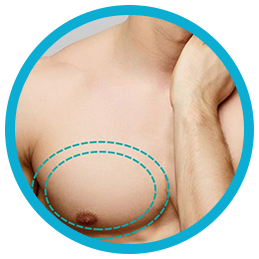
Be the Best Version of Yourself with TRT in Rochelle Park, NJ
The human body is amazing in so many ways. Still, we have to optimize it every now and then using science, medicine, and hard work. After 40, you may notice that your body is changing, but symptoms like low libido and lack of motivation don't have to be permanent. Juventee has the team, tools, and experience to help recapture your youth and feel better than ever before.
If you're getting older and you're worried about low testosterone, give our office a call today. It would be our pleasure to care for you using the highest quality products, backed by research and applied by professionals with your best interests in mind.
Whether you need a boost to help you get through your busy work week or a natural solution to an embarrassing problem like ED, we're here for you. Our doctors will explain your treatment options in-depth and take as much time as you need to feel comfortable and confident about TRT. Remember, when you treat your body with love and care, it will reciprocate generously. Let our team teach you the techniques to prolong your sense of youth and provide you with the treatment to solidify your wellbeing as you age with grace. Contact Juventee today. By tomorrow, you'll be one step closer to meeting the best version of yourself.

Latest News in Rochelle Park, NJ
What weed paid for: What are NJ towns doing with marijuana taxes?
Mike Davishttps://www.app.com/story/news/local/new-jersey/marijuana/2023/07/24/nj-legal-weed-heres-what-towns-are-using-marijuana-taxes-for/70430210007/
LAWRENCE — It seemed too good to be true.Lawrence Township Manager Kevin Nerwinski didn't believe the numbers he was seeing. Verano Holdings wanted approval to open up its Zen Leaf medical marijuana dispensary in the town to recreational customers, selling legal weed to anyone over 21 years old. The company expected millions in revenue per month and, with a 2% transfer tax on every sale, a huge windfall for the township.In the first year or two, Verano told Nerwinski that the township could see as much as $...
LAWRENCE — It seemed too good to be true.
Lawrence Township Manager Kevin Nerwinski didn't believe the numbers he was seeing. Verano Holdings wanted approval to open up its Zen Leaf medical marijuana dispensary in the town to recreational customers, selling legal weed to anyone over 21 years old. The company expected millions in revenue per month and, with a 2% transfer tax on every sale, a huge windfall for the township.
In the first year or two, Verano told Nerwinski that the township could see as much as $1 million in tax revenue.
"The numbers seemed eye-popping," Nerwinski said. "And then, on Day One, there were lines around the building. And it continued for weeks and weeks and weeks."
As the New Jersey cannabis industry enters its second year of recreational marijuana sales, municipalities are beginning to reap the tax benefits promised to officials when they signed up to become first in line. While the revenues are not budget saviors for any and likely will decrease with time and competition, town officials say it’s driving real impact.
More:What we've learned, one year after NJ legal weed sales began
More than $4.6 million was collected in cannabis tax revenue in 10 of the 12 municipalities where adult-use sales began in April 2022, according to a USA TODAY NETWORK analysis of municipal budgets and interviews with municipal officials. The impact in those municipalities is varied, often depending on the size of the municipality: In small towns, cannabis tax revenue can pay for new firefighters. In bigger cities, it's simply a way of keeping costs down.
Complete tax figures were not available in three municipalities — Deptford, Egg Harbor and Paterson, where cannabis tax revenue wasn’t listed as a budget line item and municipal officials did not return multiple requests for clarification and comment.
"It's about trying to maintain a stable tax base, particularly when the cost of everything is going up," said Mike Cerra, executive director of the New Jersey League of Municipalities. "A lot of towns want to reinvest any excess revenue into their community, in terms of upgrades and infrastructure, creating more sufficient parking, making their downtowns more walkable."
Municipal officials in towns with cannabis businesses are happy to take the extra revenue, even if it's not a jackpot, Cerra said.
"I don't think anyone went into this thinking it would be a game-changer," Cerra said. "But 2% sure is better than 0%."
There are currently 35 dispensaries selling cannabis to recreational customers. Though recreational marijuana sales are now occurring in dozens of other municipalities, the Network only analyzed those municipalities where sales began on April 21, 2022, the day New Jersey officially opened its adult-use cannabis market.
According to the New Jersey Cannabis Regulatory Commission, the state itself only collected about $20.1 million in cannabis taxes last year. The state levies two taxes on cannabis — the standard 6.625% sales tax and a social equity excise fee, which is levied on cannabis cultivators and wholesalers but earmarked for disbursement to communities most impacted by the War on Drugs.
On average, municipalities analyzed by the Network collected about $465,000 in cannabis tax revenue last year, but the range goes from about $191,000 in Monroe Township in Gloucester County, from a Botanist dispensary in the Williamstown area, to more than $1 million in Bellmawr in Camden County, home of a Curaleaf dispensary.
But just how far that cannabis tax revenue will stretch is almost directly linked to the size of a municipality or, at least, its annual budget.
Bloomfield officials are anticipating $483,250 from the local RISE dispensary this year — only about 0.5% of its $99 million budget and 0.8% of its $64 million tax levy.
But in Rochelle Park, the anticipated $480,000 collected from its Ascend dispensary accounts for more than 3% of its $14.8 million budget and nearly 5% of its $10 million tax levy.
"It's been helpful in keeping taxes low, in offsetting costs. And there hasn't been a strain on any of our services," Rochelle Park administrator Dean Pinto said. "The revenue has remained constant. It's been pretty impactful, more than we thought it would be."
The clearest success story is Bellmawr, a small borough of less than 12,000 people where Curaleaf opened its first New Jersey medical marijuana dispensary in October 2015. When it began adult-use sales last year, municipal officials expected a boom, inserting a line item anticipating $659,000 in tax revenue into its 2022 budget.
But when the dust settled, the tax revenue blew past those projections and eventually topped $1 million – about 6% of the municipal budget and nearly 11% of its tax levy.
The cannabis cash went a long way, Bellmawr Mayor Charles Sauter III said. The borough used the cannabis tax revenue to create a stipend program for volunteer firefighters, encouraging more sign-ups, and to increase salaries for its EMS department. The borough spent more than double its 2022 figures on salaries and wages for firefighters, according to budget documents, and nearly $150,000 more on EMS salaries.
There are similar stories across New Jersey. In Rochelle Park, cannabis taxes totaled nearly $550,000, four times what the township collected in municipal court fines in 2022, according to the town's 2022 budget.
OPINION:What I saw in line at a South Jersey marijuana dispensary | Mullane
“I don’t think I expected we’d be in the position we’re in now, but it’s what we hoped for,” Pinto said.
Lawrence Township budgeted $450,000 for cannabis taxes in 2023, the same as it collected in 2022. But Nerwinski said that estimate is conservative: The township expects to collect about $900,000 in cannabis taxes this year, about what Nerwinski expects the township to spend on trash collection.
"It's a game changer when you're annually struggling to put together a budget that limits tax increases but preserves services," Nerwinski said. "We look back at the decision to be one of the first municipalities to take this on, to do it in a meaningful way but in baby steps, and we're really happy we did it."
But municipal officials aren’t taking the new influx of cash for granted.
The New Jersey cannabis industry is still in its early stages, with the number of cannabis businesses already ballooning, from 12 dispensaries with recreational sales in April 2022 to 35 dispensaries as of July 2023. And there’s more on the way: To date, the New Jersey Cannabis Regulatory Commission has issued nearly 800 licenses to dispensary applicants.
The rapid expansion of the cannabis industry means competition – a win for consumers, turned off by some of the country’s most expensive cannabis prices (despite some of its lowest taxes), but a potential loss for municipalities expecting tax revenues.
While the New Jersey marijuana legalization laws give regulators the ability to increase the social equity fee to ensure tax dollars are flowing even when prices fall, there’s no such mechanism for the 2% transfer tax levied by municipalities.
Last April, the Zen Leaf store in Lawrence was the only dispensary selling adult-use cannabis in a 20-mile radius. Today, it's one of nine adult-use dispensaries — with a 10th on the way. Customers who might have traveled all the way to Lawrence may instead opt for Union Chill in Lambertville, Bloc Dispensary in Ewing or Curaleaf locations in Bordentown Township and Edgewater Park.
“Every year, there's going to be more retailers coming on board and we're going to see that revenue decrease," Nerwinski said. "So we're happy to have been one of the first to get the full fruits of cannabis retail."
In short: Cheaper weed means less tax dollars, and municipalities have to plan ahead. That means putting at least some of the cannabis revenue into surplus and not letting budget projections stray too far from actual realized dollars, Pinto said.“We can try to keep looking forward,” he said, “but we always have to keep in the back of our minds that this may not last forever.”
Mike Davis has spent the last decade covering New Jersey local news, marijuana legalization, transportation and a little bit of everything else. He's won a few awards that make his parents very proud. Contact him at [email protected] or @byMikeDavis on Twitter.
Tulfra Real Estate Begins Leasing 160-Unit Apartment Complex in Rochelle Park, New Jersey
REBusinessOnlinehttps://rebusinessonline.com/tulfra-real-estate-begins-leasing-160-unit-apartment-complex-in-rochelle-park-new-jersey/
ROCHELLE PARK, N.J. — Locally based developer Tulfra Real Estate has begun leasing The Delford at Village Center, a 160-unit apartment complex in the Northern New Jersey community of Rochelle Park. The site is adjacent to Westfield Garden State Plaza Mall. The six-story building houses one- and two-bedroom units and amenities such as a pool, fitness center, coworking lounge and outdoor grilling and dining areas. Full completion is slated for March. Rents start at $2,400 per month for a one-bedroom apartment.ShareNEW YORK ...
ROCHELLE PARK, N.J. — Locally based developer Tulfra Real Estate has begun leasing The Delford at Village Center, a 160-unit apartment complex in the Northern New Jersey community of Rochelle Park. The site is adjacent to Westfield Garden State Plaza Mall. The six-story building houses one- and two-bedroom units and amenities such as a pool, fitness center, coworking lounge and outdoor grilling and dining areas. Full completion is slated for March. Rents start at $2,400 per month for a one-bedroom apartment.
Share
NEW YORK CITY — Dallas-based JSC Realty & Investment Services has purchased a multifamily development site in Brooklyn’s Boerum Hill neighborhood with plans to construct a 154-unit project. The 113,000-square-foot site at 540 Atlantic Ave. currently houses a five-story office building that was originally constructed in 1924 and will be demolished. Stephen Palmese, Brendan Maddigan, Michael Mazzara, Ethan Stanton and Winfield Clifford of JLL represented the seller, locally based firm DMA Associates, in the land sale. A construction timeline for the project was not disclosed.
NEW YORK CITY — Marcus & Millichap has brokered the $48 million sale of Fannwood Estates, a 312-unit apartment complex in Queens. The six-story, rent-stabilized building occupies a full city block within the borough’s Rego Park neighborhood. Shaun Riney, Seth Glasser, Joe Koicim, Louis Zarif and Sean Fopeano of Marcus & Millichap represented the seller and procured the buyer in the transaction. Both parties were private investors that requested anonymity.
SCOTTSDALE, ARIZ. — CBRE has brokered the sale of a restaurant property located at 3748 N. Scottsdale Road in Old Town Scottsdale. Scottsdale-based The Shipp Family purchased the building from a private individual investor for $3.6 million.
Good Life Sports Bar and Grill signed a 10-year, triple-net lease to occupy the 5,265-square-foot property, which another restaurant formerly occupied. This location will be the Omaha, Nebraska-based chain’s first location in Arizona.
Built in 1957, the two-tenant building is currently being renovated for the new tenant that is slated to open next year.
Joe Campagno and Benjamin Farthing of CBRE negotiated the transaction.
PALM DESERT, CALIF. — Hanley Investment Group Real Estate Advisors has arranged the sale of a multi-tenant retail property located at 39575 Washington St. in Palm Desert. A Los Angeles-based private investor sold the asset to a San Diego-based private 1031 exchange investor for $3.9 million.
Bill Asher and Jeff Lefko of Hanley Investment Group represented the seller, while Omar Hussein of Del Mar-based Beacon Realty Advisors represented the buyer in the deal.
Built in 2008, the 8,500-square-foot retail property offers four tenant suites. At the time of sale, the property was fully occupied by Chipotle Mexican Grill (under a new 10-year, triple-net, corporate lease), Cornerstone Pharmacy, Luxury Nails & Spa and Keller Williams Realty Coachella Valley | Jelmberg Team.
The Delford: 160-unit luxury apartment complex in Rochelle Park opens leasing
Linda Lindnerhttps://www.roi-nj.com/2023/12/06/real_estate/the-delford-160-unit-luxury-apartment-complex-in-rochelle-park-opens-leasing/
With its grand opening four months away, the Delford at Village Center in Rochelle Park is quickly gaining recognition as a highly desirable rental community in Bergen County. Tulfra Real Estate, the developers behind this six-story, 160-unit luxury rental community, have announced that leasing has commenced, and hardhat tours are underway.“It’s an extremely exciting moment,” Sonny...
With its grand opening four months away, the Delford at Village Center in Rochelle Park is quickly gaining recognition as a highly desirable rental community in Bergen County. Tulfra Real Estate, the developers behind this six-story, 160-unit luxury rental community, have announced that leasing has commenced, and hardhat tours are underway.
“It’s an extremely exciting moment,” Sonny Jumani, CEO and president of Tulfra Real Estate, said. “Hundreds of prospects have already inquired and have been anxiously awaiting the announcement of project tours. The Delford has everything anyone could want: spectacular one- and two-bedroom luxury apartments, generous amenities and a superb location.
“Our goal was to create more than just a residence; we envisioned a lifestyle that seamlessly blends luxury with practicality. The Delford’s strategic location adjacent to the Westfield Garden State Plaza places it at the crossroads of shopping, dining and entertainment, redefining the convenience of urban living. As a result, the response to the Delford’s upcoming launch has been overwhelmingly positive.”
The Delford will offer a diverse range of layouts to cater to various lifestyles. Its spacious one-bedroom apartments provide a cozy yet elegant living space, ideal for young professionals. On the other end, the larger, two-bedroom apartments feature private balconies, providing a serene retreat for families or those desiring more space.
“The design philosophy centers around the concept of the ‘Inside of Living’ — a holistic approach that integrates comfort, style and functionality,” Marcus Lee, asset manager at Tulfra Real Estate, said. “Each apartment offers top-tier appliances, expansive kitchen areas and extensive closet space, reflecting a commitment to quality and detail. The Delford’s amenities will set it apart as a pinnacle of luxury.”
Residents also will be treated to a coworking lounge with private offices, a state-of-the-art fitness center with pool deck views and a stunning outdoor swimming pool. Barbecues with outdoor dining areas, a tranquil landscaped area with a pond, resident storage solutions for bicycles and packages, covered garage parking and an on-site concierge round out the extensive list of amenities designed for an active and social lifestyle. With a convenient location near all major highways and transportation hubs, the Delford also provides easy access to scenic parks, diverse dining options, and essential services.
“These facilities not only offer convenience but also foster a community atmosphere,” Lee said. “We’re not just building apartments; we’re cultivating a vibrant, connected community.”
Powerful storm floods riverside communities in Bergen County, New Jersey: "We can't keep going through this"
Elijah Westbrookhttps://www.cbsnews.com/newyork/news/powerful-storm-floods-riverside-communities-in-bergen-county-new-jersey/
OAKLAND, N.J. -- Residents along several rivers in Bergen County woke up to floodwaters again Wednesday, and some communities are still waiting for the worst.CBS New York's Elijah Westbrook spent the morning in several impacted towns. At noon, he reported from Carlstadt, where the flooding prompted evacuations.Several parking lots badly flooded along Gotham Parkway, making it difficult for people to get to their cars or,...
OAKLAND, N.J. -- Residents along several rivers in Bergen County woke up to floodwaters again Wednesday, and some communities are still waiting for the worst.
CBS New York's Elijah Westbrook spent the morning in several impacted towns. At noon, he reported from Carlstadt, where the flooding prompted evacuations.
Several parking lots badly flooded along Gotham Parkway, making it difficult for people to get to their cars or, in some cases, leave their buildings.
The fire department set up a command across the street for anyone who may need help evacuating.
Westbrook began his morning in Oakland, where the waters had started to recede after pouring onto properties overnight.
The flood area sits right between two bodies of water -- Crystal Lake to one side and the Ramapo River on the other. One longtime resident said it was so bad, the fire department had to come out.
"About 12:30 this morning, I was woken up by the fire department, because at that time they'll ask you if you want to evacuate and everything. So I went outside, checked our lake, which is Crystal Lake, and it was completely starting to go in the backyard. Then, the road here was completely covered where you couldn't get a vehicle through," she said. "We're still concerned, because they're going to say it's going to crest this afternoon, and the river is really high."
Another resident walking his dog said his roof started leaking under the stress of the heavy rainfall.
"It was about a-quarter-to-3 and all of a sudden, I feel something dripping on my head. I'm like, 'Oh no.' Got out of bed, woke up the wife, turned the lights on, and I see water dripping out of my ceiling fan," said Howard Mednikoff. "I felt like Dorothy in 'The Wizard of Oz.' It was really bad. I don't know if something fell. I didn't hear a big clunk on my roof, so I don't know if a tree fell. It's too dark for me to see."
Watch Tony Sadiku live in Lodi
Westbrook later went to Rochelle Park, where residents on Cedar Drive had to walk in knee-deep water to move their cars.
"My yard is flooded because there's a storm drain that runs through the whole thing. I have probably a good foot and a half of water against my fence line," resident Robert Belli said.
"We get water here, usually when the rain is real heavy. But now, it's 2-3-inch rains. We're starting to get water up the street, and that's killing us here. You've got to sit and worry all day about water going in your garage, down your basement. Three times already I lost the basement and the first level," another resident said.
Westbrook asked him what's next for his neighbors on the block.
"We've got to hope the water stops and starts receding, which it looks like it might be now. But we can't keep going through this," the man replied. "The town has done nothing to help anybody here with the flooding. They just put cones up and say don't go down the street. But I'll be looking to sell in the spring."
Officials with the Rochelle Park Office of Emergency Management said they did not receive any calls about people being trapped, damage to homes or injuries, but they continue to monitor the situation.
Hear from Gov. Phil Murphy on storm impact
The nearby Saddle River also breached its banks and flooded in Lodi. CBS New York's Tony Sadiku reported from Main Street, where the water crested around 10 feet, submerging the street from Sydney to Kennedy.
Public schools closed for the day, along with several local businesses. One business owner said he was there since 4:30 watching the water rise.
"They said 12 o'clock is supposed to be the height of the crest, so, hopefully, it will only crest another foot and then it won't go inside my building. If it does, then we're in trouble," said Frank Staffa. "This is bad, but I've never seen it this high."
Sadiku also spoke with residents on Money Street who said it's some of the worst flooding they've seen in years.
"Downtown, there's literately rushing water going over people's houses, flooding people out of their apartments. They've got the cops pulling people out by the school," one man said. "Seems like it's all just coming this way and going into downtown. The people over there, they've got boats ready to do something and get people out of there."
It was officially the seventh-highest crest for the river on record.
Watch Paterson mayor on storm impact
Downstream in Passaic County, Paterson Mayor Andre Sayegh reported a dozen rescues and 30 street closures due to localized flooding. He said at least 20 people were accommodated at a shelter and no injuries were reported.
Sayegh told CBS New York his team is keeping an eye on the Passaic River, which caused devastating flooding last month.
"Expected to crest tomorrow at approximately 5 p.m., and it could be 10 feet or more," he said at a briefing later in the morning. "Which is a similar situation to what occurred a few weeks ago, which would adversely impact residents who are in the low-lying areas."
CBS New York also spoke with the mayor of Little Falls, who said, so far, the town has only seen localized street flooding -- nothing like the damage from a few weeks ago.
"Now, of course, all focus is turned to the Passaic River, where we're continuing to monitor the gauges," said Mayor James Damiano. "Stay strong. We're going to get through this together, and Little Falls will be there for you."
Hear from Little Falls mayor on storm impact
Gov. Phil Murphy issued a state of emergency for the storm that's expected to wrap up Wednesday. He told CBS New York's Chris Wragge the flood concerns aren't in the clear.
"A decent amount of flooding, a decent amount of power outages. It was a storm about as we expected, and thank God it's through the system," Murphy said. "We've got something else coming in in a couple of days, and the worry there is the cumulative effect will have a big impact here with such saturated ground in particular."
Wragge asked the governor about back-to-back storms, and what more can be done to help local municipalities with their mitigation efforts.
"There's good news and then there's challenging news," Murphy replied. "The good news is we work well with these mayors and we've made some significant progress. The bad news is Mother Nature ain't going away. The storms are more frequent and more intense, and we are -- not just in New Jersey, I'd say, in American and around the world -- we're chasing these storms, as opposed to getting out ahead of them."
Schools in Paramus, Ridgewood and Montclair had a two-hour delayed opening Wednesday, and Paterson schools were to be dismissed early. Students in Woodland Park have remote classes, and Randolph schools will be closed for the day in Morris County.
As of 11 a.m., PSE&G New Jersey reported 7,753 customers without power, and JCP&L had 25,666 outages.
As people start to survey the damage, they're reminded to watch for downed power lines and avoid any floodwaters.
Stick with our First Alert Weather team for the latest forecast and coverage of the cleanup.
Elijah Westbrook is an Emmy Award-winning journalist. He joined CBS2 News and CBS News New York in January 2022.
Dunkerhook Road, Paramus, is Closed Due to Flooding
TAPintohttps://www.tapinto.net/towns/paramus/sections/bergen-county-news/articles/dunkerhook-road-paramus-is-closed-due-to-flooding
You May Also Be Interested InBergen County NewsThe Valley Hospital Named One of America's 100 Best Hospitals for 2024 by Healthgrades ...
You May Also Be Interested In
The Valley Hospital Named One of America's 100 Best Hospitals for 2024 by Healthgrades
Fans Lining Up for Rapper 50 Cent's Bottle Signing at Stew Leonard's, Paramus
Audrey Meyers, CEO of Valley Health System, Named on 2024 NJBIZ Power 100 List
RIDGEWOOD, NJ - Valley Health System congratulates Audrey Meyers, Chief Executive Officer ...
RIDGEWOOD, NJ - The Valley Hospital is pleased to announce treatment of the first patient ...
RIDGEWOOD, NJ -The Valley Hospital is proud to announce it is a winner in the Clinical ...
Home & Garden
By MELINDA MYERS
NEW JERSEY - Just like us, insects spend their winters in different locations. Unlike us, ...
Cold Blooded by Anita Paddock
Cold Blooded by Anita Paddock. Pen-L Publishing, 2019. Dubbed by her friends as ...
It's the Thought That Counts
I was perplexed to learn via breaking headline news recently that Elon Musk has ...
Disclaimer:


 201-292-0706
201-292-0706
